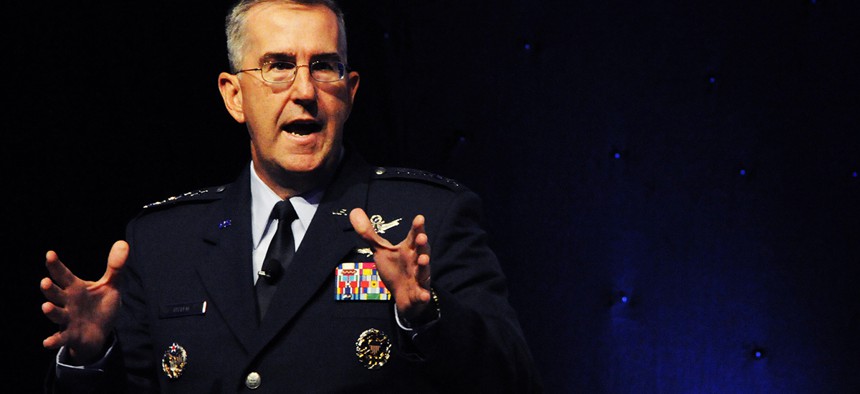The Air Force’s Next Chief Might Be Its Space-War General

General John Hyten U.S. Air Force
Gen. John Hyten has never flown a warplane, but he plays a role in just about every Air Force mission.
COLORADO SPRINGS, Colo. – Gen. John Hyten’s office is 7,000 miles from the battlefields of Iraq and Syria, but the men and women he commands help guide just about every bomb dropped on an Islamic State target.
Still, it’s another theater entirely that worries the head of Air Force Space Command — and top Pentagon leaders.
“The growing vulnerability of our space assets is both a strategic and operational problem,” Deputy Defense Secretary Bob Work said Tuesday at the National Space Symposium, an annual conference sponsored by the Space Foundation. “Strategically, space system vulnerability contributes to crisis instability because it provides incentives for preemption of our space assets.”
From Peterson Air Force Base near the foot of the Rocky Mountains, Hyten oversees the 38,000 airmen who operate their service’s diverse constellation of spy, communications, and global positioning satellites that support and enable military operations around the world. He also oversees the Air Force’s cyber forces.
Now, Hyten is being considered for another job: Air Force chief of staff. Should that happen, he would be the first nonpilot to lead the service since it was created in 1947. His selection would underscore that Pentagon leaders expect future wars to be fought not just terrestrially, but in space and online.
Hyten’s remarks here at the National Space Symposium could well be his last public comments before President Obama nominates a replacement for Gen. Mark Welsh, the Air Force chief of staff who is retiring July 1. Pentagon sources say Hyten is a leading candidate.
Since becoming the head of Space Command in August 2014, the Harvard ROTC graduate has sought ways to better protect the Air Force’s space and cyber assets against battle damage.
“It’s not about the single satellite,” Hyten said. “It’s about the force package that you build around that satellite to defend the satellite.” Such defenses might have components in other warfighting domains.
“If war, God forbid, does extend into space some day…the first response could be in cyberspace, or in the air, or terrestrial. It could be in a number of different places,” he said.
Hyten is hardly the only Pentagon leader sounding the alarm about the vulnerability of U.S. satellites, but he has become a national voice on the issue. Last year, he appeared on “60 Minutes” to talk about the ways space is becoming more contested. Russia and China have been building anti-satellite weapons. A bit ominously, Russia has positioned a satellite near ones operated by Intelsat, an American defense contractor.
Work summed it up this way: “One of the problems we face today is that cutting-edge military technology is providing competitors with the capabilities to take out our space assets – at very low cost.”
Many U.S. military satellites cost over $1 billion, not counting the eight-figure price to put it in orbit.
“Missiles that could destroy that satellite cost a small fraction of that sum; co-orbital microsatellites that could conduct kamikaze attacks cost even less; and lasers that might blind or damage satellites have an unlimited magazine of relatively low-cost shots,” Work said.
On Tuesday, Hyten underlined the importance of space to every military mission. Satellites carry signals from drone operators in Nevada to UAVs over Afghanistan. In the current U.S. campaign against ISIS, more than 90 percent of the bombs dropped by American warplanes are guided to their targets by GPS. He showed a video that depicted the tick-tock satellite communication involved in every airstrike.
He then showed a photo of Air Force pararescuemen on a mountain in Afghanistan who rely on those satellites. He stressed the need to make sure those guys on the ground are never left in the dark.
“It just flat-out can’t ever happen,” he said. “Because those soldiers that are on top of that hill in the Middle East can never be left alone.”
Back on the ground, Hyten has been pushing for companies to lower the cost of launching satellites into orbit.
“The things that we have to do, the things that we want to do in the future, require more ready access to space,” he said. “Right now, if launch continues at the cost levels that they are, we can’t do a lot of things we need to do in the future.”
But perhaps more near and dear to Hyten’s heart are the troops on the ground, the ones that rely on each one of his satellites every day.
“Our job is to make sure they’re never ever alone on the battlefield,” he said.






